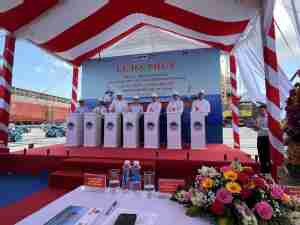Hudson Shipping Lines, Inc. ('Hudson'), a dry bulk Supply Chain Management company operating a fleet of 42 dry bulk vessels, has announced their fleet has achieved an average carbon dioxide efficiency rating of 'C' using RightShip's Existing Vessel Design Index (EVDI') and Greenhouse Gas (GHG) Emissions Rating. This puts Hudson in the top one-third of the global fleet for energy efficiency and greatly improves Hudson's competitiveness with charterers who consider energy efficiency as part of their vessel selection process.
Presently, ten RightShip charterers, who collectively ship over one billion tonnes of cargo (15% of world's annual bulk movements), include the GHG Emissions Rating as part of their vessel selection process ' this equates to around 15,000 voyages each year.
Announcing the achievement, Hudson's Global Operations Director, Chad Meade said:
'Vessels with higher environmental ratings standout from other vessels in the same deadweight class as the fuel savings really add up without any additional equipment or retrofitting. This makes them much more attractive to charterers who are seeking to cut bunker costs while demonstrating their sustainability credentials. This is a 'win-win' scenario where the environmental and commercial interests unite to everyone's benefit.
Hudson is always looking for ways to increase sustainability and reduce the carbon footprint by decreasing the burning of fuel and emission of carbon for carrying cargo. The RightShip rankings are an effective, well thought out process that provides a solid baseline of a vessel's emission rating used by charterers to make valuable decisions on which vessel will be the most economical to the environment and the voyage.
We regularly review the vessels we have on charter and proactively look to develop opportunities with owners who have an upgraded and efficient fleet of vessels to charter. This is an ongoing effort that involves educating owners to understand that efficiencies and the environment go hand-in-hand and are good for all our businesses,' added Mr Meade.
Commenting on the energy efficiency of Hudson's fleet, Warwick Norman, CEO, RightShip said:
'Hudson has recognised the importance of environmental credentials in today's market by embracing the EVDI as an effective method of measuring the efficiency of the existing fleet. Not only are their vessels more likely to be selected by charterers who factor efficiency into their vetting process, but several of our banking customers consider the A ' G Greenhouse Gas Emissions Rating scale as part of their loan underwriting process. In addition, financial institutions consider fuel efficiency as part of the discounted cash flow analysis in vessel valuation.
More than 50% of Hudson's fleet has an GHG Emissions Rating of A, B or C and these vessels qualify for discounted harbor due rates through Port Metro Vancouver,' he continued.
'There is a growing acceptance among industry that while the carbon dioxide emissions from shipping are low compared to other transportation modes, collectively they are significant. Reducing emissions will involve a co-ordinated approach across all sectors. Due to competing industry interests it is challenging to get consensus on the issue and this means market forces will always move faster than legislation.
It is also important to separate the debate about what can be measured and what can be legislated and an optimal industry outcome will only be achieved if it is unilateral. Many regional solutions such as taxes, Emission Control Areas and exemptions for developing countries have been canvassed but they only add complexity, compliance and cost to industry without achieving a meaningful reduction in CO₂ emissions. Hudson recognises that informed vessel selection is the simplest form of a market based solution and that it is already working to reduce emissions and save industry money,' Mr Norman commented.
RightShip's environmental ratings provide efficiency information on










